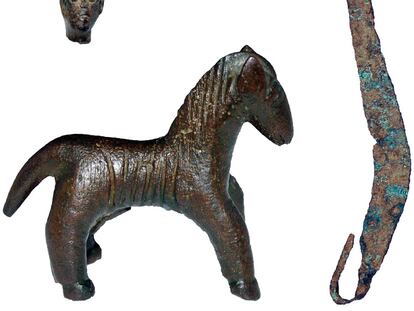The five 17th-century volumes belonging to the work of Sor Juana Inés de la Cruz were kept in the convent of the Carmelitas Descalzas de Santa Ana, in Seville.
The nuns had printed on them a stamp that proved their ownership, which is known as an
ex libris.
But it is not known how, these ended up in the hands of a resident of Catalonia, who died about ten years ago, and whose bibliographic collection passed into the hands of a "well-known bookstore in Madrid", according to a statement from the Civil Guard.
This trade, in turn, sold them to a Mexican businessman who was fond of ancient literature.
When he died, the works were acquired by an American, who put three up for auction at the Swann Aution Galleries in New York (United States).
Yesterday, two of the copies, the ones that had the stamp of ownership of the convent printed, have been delivered to Spain.
They are waiting to recover the third, which does not have the seal of the monastery, but which undoubtedly has the same origin.
More information
A repentant looter leads to the discovery of an Iberian bank by returning part of what he looted
The Historical Heritage Section of the Central Operational Unit of the Civil Guard Civil Guard (UCO) had been carrying out the so-called Ellis operation since 2021.
The researchers tried to unravel the smuggling system of old printed books in Madrid and Barcelona at the end of the 17th century, especially those belonging to the work of the writer Sor Juana Inés de la Cruz (Mexico 1648-1695).
The alarms went off when the New York auction house announced that three were for sale.
The intervention of the Ministry of Culture and Sports made it possible to stop the planned bid for the three copies, which went on the market between 80,000 and 120,000 dollars, far exceeding the 50,000 euros established by Spanish law to consider it a "smuggling crime in relation to assets that are part of the national historical heritage ”, explains the Civil Guard in a note.
The Antiquities Trafficking Unit of the New York District Attorney's Office studied the case and determined that, under US law, two of the books could be returned to Spain, since "they had the seal of the convent and this was the legitimate owner of the works.”
Sor Juana Inés de la Cruz was a writer whose life passed in the Viceroyalty of New Spain, in the part that today corresponds to present-day Mexico.
She is an author of great importance in the Spanish Golden Age, both for the depth and quality of her works and for the fact that she is considered by a large part of the intellectual community as the first feminist author of the empire. Spanish.
Hispanist Dorothy Schons, a great scholar of her work, thought that she was "the initiator of the feminist movement in America two hundred years before the American suffragist Susan B. Anthony."
Due to the revolutionary characteristics of the work of the Hieronymite nun, social pressure caused a large part of her work to be destroyed and she even stopped writing and dedicated herself entirely to the monastic life.
"The recovery of original volumes of her works is considered essential to preserve the values on which Western democracy is based," says the ministry.
The crimes investigated by the Civil Guard, especially those related to smuggling, often have little criminal experience.
This is due to the very concealment activity of the traffickers who, knowing that over time the crime prescribes, "wait to put up for sale different cultural goods in their possession in different countries," explains Interior.
However, as established in article 29.1 of the Spanish Historical Heritage Law, “the movable property that is part of the Historical Heritage that is exported without the required authorization belongs to the State.
Said assets are inalienable and imprescriptible.
On this occasion, the disposition of both the US agency Homeland Security (HSI) and the New York District Attorney's Office, through its Antiquities Trafficking Unit, have been essential for the recovery of two of the books “The recovery of the third remains pending, and although it does not have the seal of the convent stamped on it, it was also illegally exported.”
The act of delivery of the works was held yesterday at the New York Prosecutor's Office.
Prosecutor Alvin Bragg has delivered the copies to Alfonso López Malo, Colonel-in-Chief of the UCO.
The event was also attended by the Consul General of Spain, Caridad Batalla Junco, the United States Ambassador to Spain, Julyssa Reinoso, and the head of the Antiquities Trafficking Unit of the New York Public Prosecutor's Office, Matthew Bogdanos.


/cloudfront-eu-central-1.images.arcpublishing.com/prisa/3R5DK4T3QFGLDNNR6CM6BQU6DA.jpg)



/cloudfront-eu-central-1.images.arcpublishing.com/prisa/BY22V52JGRHFNFQGPXLPPDLKUI.jpg)
/cloudfront-eu-central-1.images.arcpublishing.com/prisa/CDSCRU7RMRABHAWONGLE4TAOYQ.jpg)

